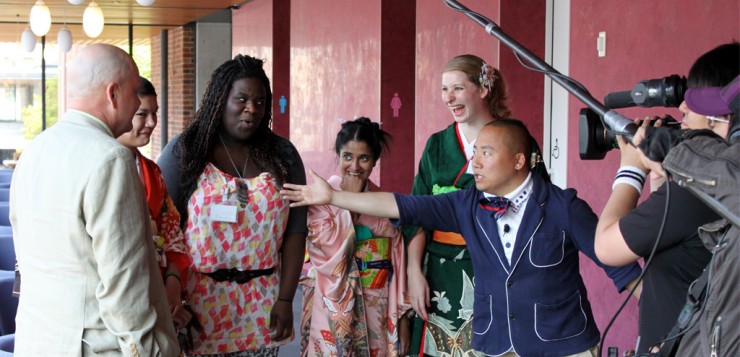Like many Canadian kids, Anupa Simon’s interest in Japanese culture started with a Pokémon obsession when she was 10 years old.
However, her love of all things Japan didn’t fade away once she lost interest in those adorable animé characters. Anupa ended up in the communication studies and multimedia program at McMaster University in Hamilton, Ont., pursing a minor in Japanese.
Then, in her second year, she learned that there were opportunities to study abroad at schools around the world. “I’ve always been interested in other countries and cultures, but Japan was my first choice.”
I was terribly shy before I went abroad, and now I find it’s much easier to speak with people.” –Anupa Simon, graduate, McMaster University
There were just two options in Japan for humanities students: Osaka, known as a party city, or Fukuoka, a quieter location with a university campus that is minutes from the beach. Fukuoka also happened to offer accommodations in a newly-built dorm with other international students, so Anupa decided to spend her third year there.
“Choosing Fukuoka was one of the best choices of my life,” she says.
Anupa had already been learning and speaking Japanese for two years before going abroad, so all she had to do before she departed was brush up on Japanese culture and etiquette. She says she didn’t want to be “one of those foreigners who disrespects the country’s culture without even realizing because they didn’t do their research.”

Upon arriving in Fukuoka, a city of about 1.5 million people on the northern shore of the island of Kyushu, Anupa settled into the I-House at Seinan Gakuin University – the “I” stands for “international” students.
There were a couple of friendly, English-speaking Japanese student advisors living on each floor to help Anupa and the roughly 30 other international students adjust to living and studying in Japan. “They helped us go about the more difficult things in Japan, like getting a cell phone and doing Japanese paperwork,” she says.
She also had a tough time dealing with one thing she never thought to look into before she left Canada: Japanese toiletries. “It was impossible to find good deodorant in Japan,” Anupa says. “The toothbrushes were also weirdly hard and hurt my gums.”
But, for the most part, it was pretty smooth sailing. She knew her grades would go back to McMaster as either a pass or fail, so she focused her energy on having fun instead of getting As. “I had a great social life,” she says. “The experiences I gained outside the classroom were more valuable to me than what I learned academically.”
Like many university students, she spent a lot of time hanging out in bars and clubs with her friends. “Women can get ‘nomihodai’ (all you can drink) for as little as 500 yen (about $6) and most clubs stay open until 5 a.m. – some even later,” Anupa says. “Looking back on it, I have no idea how I survived on such little sleep.”
Don’t worry, she had some memorable experiences outside of the bars too: she climbed a mountain alongside some wild monkeys and was randomly filmed by TV crews on three separate occasions.

The best part of her time abroad, though, was the people she met in Japan. “I can’t stress enough how many amazing people you’ll meet abroad,” she says.
She has stayed in touch with many of her international friends since leaving Japan in May 2010. “I have been to five countries – Hong Kong, England, France, Sweden and the U.S. – visiting friends from around the world who I met on my exchange, and I also visited an international student I met at McMaster in South Korea,” she says.
“I have friends in Japan who I can stay with if I ever go back, and I’ve even had friends from Japan visit me in Toronto.”
Anupa graduated earlier this year and says the most important impact studying abroad has had on her career is that it’s made her much more confident – about everything. “I was terribly shy before I went abroad, and now I find it’s much easier to speak with people who I either don’t know or who might have intimidated me before,” she says.
“I also just became a more interesting person; don’t underestimate the power of improving your personality. You have a better chance of moving from a contract position to a full-time position if people enjoy working with you.”
Would she recommend studying abroad to other students? “Yes, yes and yes. I came back a different person from my study abroad,” she says.
“I can’t even begin to describe what an amazing experience it is, so you’ll just have to try it and see for yourself!”
By Cassandra Jowett, TalentEgg.ca
TalentEgg is Canada’s leading online career resource for students and recent graduates.








Discussion7 Comments
I have noticed you don’t monetize your website, don’t waste
your traffic, you can earn additional cash every month
because you’ve got hi quality content. If you want to know
how to make extra bucks, search for: best adsense alternative Wrastain’s tools
Thanks for Sharing Its Very Informative For Me
Thanks for Sharing Its Very Informative For Me
good thanks a lot
merci pour vos efforts
very nice
I like the valuable information you provide in your articles Thanks for sharing